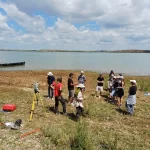The seminar will take place on 17 September 2024 at 11:00 am (EET), and our guest speaker is Professor Ahmed M. Abdel-Azeem from the Suez Canal University from Egypt.
He will give a lecture entitled “Fungi and Cultural Heritage”.
Ahmed (Zemo) is a professor of mycology at the Botany and Microbiology Department, Faculty of Science, Suez Canal University in Egypt. He is the founder and president of the Arab Society for Fungal Conservation and an executive committee member of the International Mycological Association (IMA). He was a founding member of the International Society for Fungal Conservation, a member of the European Mycological Association, and a member of the Mycological Society of America. Abdel-Azeem is the president of the African Mycological Association (AfriMA), and he founded Egypt’s National Fungus Day, African Annual Fungus Day, and many mycologists’ networks, including Egyptian, Iraqi, Algerian, Libyan, and Pakistani networks. He is the founder of Pan Arab Mycologists. Abdel-Azeem is particularly interested in ecology, taxonomy, biology, secondary metabolites, endophytes, and fungi conservation, with a particular focus on members of the phylum Ascomycota. Abdel-Azeem studies the fungal deterioration of cultural heritages like Abydos Middle Cemetery, Cheops Ceremonial Unveiled Boat, Al-Aqsa Mosque in Occupied Palestine and San El-Hagar stony monuments. Abdel-Azeem has the necessary vision combined with proven experience leading and successfully completing more than 15 complex and ambitious local and international projects. In 2013, he was awarded the President’s Fungal Conservation Award. He is a member of the IUCN Species Survival Commission Specialist Group for Cup Fungi, Truffles, and Their Allies. He is also a member of the IUCN’s Fungal Conservation Committee (FunCC). He has published more than 120 research papers in international journals, 60 book chapters in international publisher books, and 12 books.
More info here and at email ahmed-Abdelazeem@science.suez.edu.eg.
This seminar focuses on the dual role fungi play in cultural heritage—both in biodeterioration and as potential tools for preservation. Fungi are known for degrading historical artefacts like wood, paintings, fabrics, and paper due to their enzymatic activity and ability to grow in low-moisture environments. The decay processes they cause have been observed throughout history, even mentioned in the Bible as “leprosy” affecting structures. Despite their damaging effects, fungi also offer the potential for bio-preservation. This seminar will explore new methods that harness fungi’s beneficial properties for conserving monuments, providing sustainable solutions to prevent further degradation of archaeological treasures, such as stony monuments and mummies.
These seminars are an original initiative of the ArchaeoSciences Platform (ASp) at ICUB that aims to provide a setting for professionals in the Archaeological Sciences field from different parts of the world to share knowledge and transmit meaningful information about the latest issues regarding the current methods and approaches used to study the past. It is also a chance for Romanian students to learn more about the various interdisciplinary aspects of archaeology.







